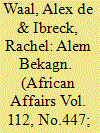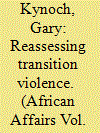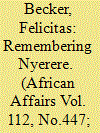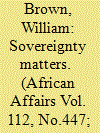|
|
|
Sort Order |
|
|
|
Items / Page
|
|
|
|
|
|
|
| Srl | Item |
| 1 |
ID:
119116


|
|
|
|
|
| Publication |
2013.
|
| Summary/Abstract |
The African Union's new offices in Addis Ababa stand upon the site of the city's former central prison, known as Alem Bekagn, where thousands of people suffered and died. This article traces the history of the prison and examines efforts to create a memorial at the site. These initiatives illustrate the African Union (AU) in transition. They echo AU commitments to act against atrocities and in support of rights and justice and suggest a distinct vision of pan-African community and a corresponding institutional culture. But, much like the AU itself, the meaning of the planned memorial is ambivalent and contested. The fact that the AU bulldozed Ethiopia's most notorious prison in order to establish its new offices and a conference hall is richly symbolic of 'buried memory' - the tendency of post-colonial elites to suppress the memory of victims of state violence while celebrating chosen heroes. The AU still venerates leaders and is quiet about current violations, but the organization's promise and process to remember the ordinary victims of state violence indicate a political opening and may contribute a novel space for the recounting of human rights abuses.
|
|
|
|
|
|
|
|
|
|
|
|
|
|
|
|
| 2 |
ID:
119122


|
|
|
|
|
| Publication |
2013.
|
| Summary/Abstract |
THIS BRIEFING EXPLORES SOME POLITICAL IMPLICATIONS of the current boom in information and communications technology (ICT) in sub-Saharan Africa. As a striking manifestation of globalization, perhaps half of Africa's one billion people are now signed up as subscribers to cellular telephone networks.1 Africans are enthusiastically adopting mobile phone technology, here called 'cell' phones. By foregoing landlines in favour of advanced telecom systems, their choices of technology are leapfrogging over other parts of the world.
|
|
|
|
|
|
|
|
|
|
|
|
|
|
|
|
| 3 |
ID:
119118


|
|
|
|
|
| Publication |
2013.
|
| Summary/Abstract |
Livestock raiding among northern Kenya's pastoralists has changed profoundly in the last decades. Fought with modern weaponry and often extreme violence, raiding is increasingly enmeshed in politicized claims over administrative boundaries, struggles for exclusive access to land, and attempts to establish or safeguard an ethnically homogeneous electoral base. These conflicts are part of Kenya's troubled politics of decentralization and as such they must be viewed in the context of wider political developments in the country. Based on ethnographic fieldwork in East Pokot and surrounding areas in Kenya's Central Rift Valley Province, this article demonstrates how livestock raiding emerges as a specific form of violent regulation, a well-adapted, dangerous, and powerful political weapon.
|
|
|
|
|
|
|
|
|
|
|
|
|
|
|
|
| 4 |
ID:
119121


|
|
|
|
|
| Publication |
2013.
|
| Summary/Abstract |
Drawing on interviews with people involved in the communal violence that traumatized Thokoza and Katlehong townships in the early 1990s, this article challenges the received wisdom regarding transition violence in South Africa. Most significantly, it transcends the dominant narrative that African National Congress (ANC) supporters in the townships were under relentless attack by state security units known as the 'third force', along with the co-opted impis of the Inkatha Freedom Party (IFP). The evidence presented indicates that Inkatha was responsible for much of the violence, but that ANC-affiliated militants also conducted murderous campaigns. Some police commanders and their units initiated violence for political ends, but different police and military groups operated independently and lacked a uniform political orientation. Some favoured the IFP, some backed the ANC, while others were divided or indifferent. Thus, the narrative that casts the ANC as victims of a state-orchestrated onslaught versus the Inkatha sell-outs who opportunistically sided with the white government (and its security forces) does not accurately capture events on the ground in Thokoza and Katlehong, two of the townships most afflicted by transition violence. A more fractured, less partisan picture emerges from the voices of those who survived the township wars.
|
|
|
|
|
|
|
|
|
|
|
|
|
|
|
|
| 5 |
ID:
119119


|
|
|
|
|
| Publication |
2013.
|
| Summary/Abstract |
This article examines the changing uses of political rhetoric around the burial of Julius Nyerere in 1999. It argues that the ruling party uses rhetoric as a means of 'soft power', but also documents how this rhetoric, though geared towards legitimizing Nyerere's successors, employed tropes that were rejected by some people and were used by others to critique leaders who were perceived to lack the selfless integrity attributed to Nyerere. The article compares funerary songs by a government-sponsored band, popular at the time of Nyerere's death, with memories of Nyerere in rural areas in the early to mid-2000s. While the image of Nyerere in the funeral songs as a benign family patriarch writ large still persists, it coexists with strongly divergent constructions of Nyerere as an authoritarian ruler or a self-seeking profiteer. Moreover, the 'official', benign Nyerere has been employed not only by government and party faithful, but also by striking workers, opposition politicians, and critical newspapers as a measure of the shortcomings of his successors. The invocation of Nyerere as a paragon of an endangered ideal of virtue in public office indicates widespread anxieties towards a state that often disappoints but occasionally delivers, in unpredictable turns, and the limits of the government's ability to shut down dissent.
|
|
|
|
|
|
|
|
|
|
|
|
|
|
|
|
| 6 |
ID:
119120


|
|
|
|
|
| Publication |
2013.
|
| Summary/Abstract |
This article critiques the predominant opinion that aid undermines the sovereignty of African states. This claim implies not only that a recipient state's policy autonomy is curtailed by development assistance, but also more fundamentally that the politico-legal independence of the state itself is being challenged. While the former is often the case, the latter is not. Drawing a conceptual and analytical distinction between sovereignty as a right to rule and national control over policy and outcomes, the article develops a more accurate identification of the areas in which aid, as a particular form of external influence, does and does not have an impact on recipient states. It argues that sovereignty as a right to rule constitutes the very basis of the aid relationship, and endows African states with the agency with which to contest the terms of aid deals. The article thus provides a new reading of the politics of aid and, by reasserting the centrality of sovereignty as an organizing institution in contemporary aid relations, supports rather than questions the relevance of the discipline of International Relations to African studies.
|
|
|
|
|
|
|
|
|
|
|
|
|
|
|
|
|
|
|
|
|